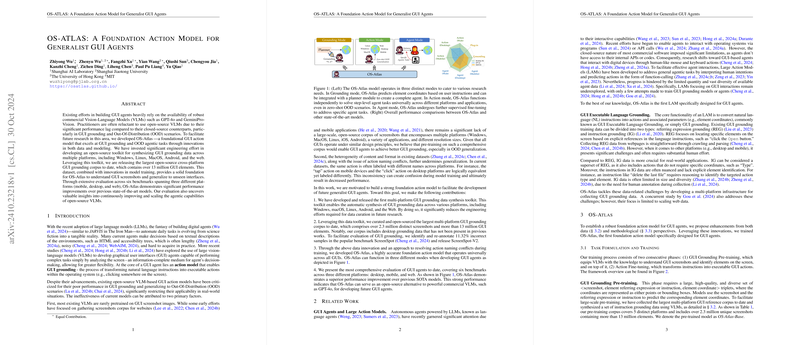Insights into OS-ATLAS: A Foundation Action Model for Generalist GUI Agents
The paper "OS-ATLAS: A Foundation Action Model for Generalist GUI Agents" presents a comprehensive paper on improving graphical user interface (GUI) agents through innovative approaches in data collection and modeling strategies. This research is particularly relevant given the current reliance on closed-source Vision-LLMs (VLMs) like GPT-4o and GeminiProVision in the field.
Summary of Key Contributions
The authors have developed OS-Atlas, an open-source foundational action model that addresses critical issues in GUI grounding and OOD generalization. The paper identifies two primary shortcomings of existing VLM-based GUI action models: inadequacy in GUI-specific pre-training data and action naming conflicts in datasets across different platforms.
- Cross-platform GUI Grounding Data Synthesis: The authors have created a substantial open-source toolkit for synthesizing GUI grounding data that spans multiple platforms such as Windows, Linux, MacOS, Android, and the web. This toolkit supports the development of the largest open-source cross-platform GUI corpus to date, containing 13 million GUI elements. This diverse dataset enhances the model’s capacity to generalize unseen interfaces.
- Unified Action Space for Training: In response to the problem of heterogeneity in action dataset content and format, the development of a unified action space resolves conflicts in action naming, thereby improving model generalization. This strategy effectively aligns action representations across varied datasets, strengthening the OS-Atlas’s adaptability and performance in multi-platform environments.
- Comprehensive Evaluation: OS-Atlas’s performance was evaluated across six benchmarks on three platforms: mobile, desktop, and web. The results demonstrate significant improvements over state-of-the-art models, confirming the potential of OS-Atlas as a robust alternative to closed-source VLMs in GUI agent development.
Numerical Performance and Bold Claims
The reported results indicate OS-Atlas’s strong performance, achieving state-of-the-art results across multiple complex benchmarks. This significant advancement suggests OS-Atlas can feasibly replace commercial models such as GPT-4o in the context of GUI agents. The paper further suggests that this performance edge is attributed to the novel grounding data collection process and the refined training methodologies implemented.
Implications and Future Directions
The implications of this work are profound, both practically and theoretically. Practically, OS-Atlas offers an open-source avenue for developing generalist GUI agents, which can drive innovation and accessibility in the field away from the constraints of proprietary VLMs. Theoretically, the paper sets a precedent for integrating broader cross-platform GUI data into the VLM training pipeline, potentially propelling future research on enhancing agent generalization across diverse digital environments.
In terms of future developments, the direction and emphasis on leveraging the breadth of the synthesized data and the unified action space are likely to continue. Further scaling of the grounding data, alongside refined training techniques, could enhance the VLM's performance on nuanced GUI tasks. Moreover, addressing advanced interaction tasks may require integrating adaptive learning mechanisms that can dynamically adjust to new environments and tasks.
In conclusion, the OS-Atlas framework represents a significant advance in the creation of GUI agents, driving open-source efforts to compete with and complement existing commercial models through innovative data and methodological strategies. This paper serves as a potential keystone for future research aimed at developing more efficient, generalizable, and open-access digital agents capable of cross-platform interactions.
